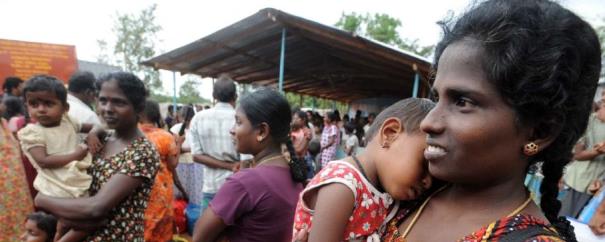( A Tamil woman holds a baby girl at a camp for internally displaced people in the northern town of Vavuniya )
AFP/ By Amal JAYASINGHE.
Colombo (AFP) – Up to 100,000 people still living in camps six years after the end of Sri Lanka’s brutal ethnic war will be given land to build homes within six months, President Maithripala Sirisena told AFP Sunday.
The leader, elected last January, has won praise for starting to hand back land after the end of one of South Asia’s longest and bloodiest ethnic wars, which pitted the government against Tamil separatists. But he is also under international pressure to do more to reconcile the ethnically divided nation.
“It is an ambitious target, but I will see that all the internally displaced people are given land to build homes,” the president said in an interview with AFP.
“I am setting up a mechanism to complete this process within six months.”
Sirisena said he would give land to civilians displaced by war in the embattled northern and eastern provinces, and also the northwestern coastal region of Puttalam, by the middle of this year. The families set to receive the land are currently staying in camps in those areas.
During a visit to the northern city of Jaffna last month, where much of the civil war fighting took place, Sirisena said he visited a refugee camp that has been home to about 1,300 families for the past 25 years.
“This is an unacceptable situation. I want to end this problem once and for all,” he said.
“For many people the main issue was lack of land and that is something we will resolve in the next six months.”
As part of a parallel scheme, he is also planning to free up additional private land occupied by the military, mainly in the former war zones in the northern and eastern provinces, starting in the next two weeks.
He said he would return to Jaffna this month to formally hand over about 700 acres (283 hectares) of land as part of the plan, in line with his election promise.
Sirisena, 64, came to power with the backing of Sri Lanka’s minority Tamils and Muslims, on top of the majority Sinhalese who supported him, on the back of pledges to ensure ethnic reconciliation and end corruption and nepotism that plagued his predecessor’s rule.
Soon after his election, Sirisena ordered security forces to return thousand of acres of private land they occupied in the Jaffna peninsula, the de facto capital of Tamil Tiger rebels.
The area saw some of the bloodiest fighting during the war that claimed over 100,000 lives between 1972 and 2009.
Sirisena said Sunday the new land pledges were in addition to that previously promised, although he has not specified the total area of land to that will be handed out.
– War crimes probe –
He said the government was also working on a mechanism to investigate allegations of war crimes in the final stages of the conflict, but said it could take time.
“We can’t rush the accountability process,” Sirisena said. “Some people want it to be like instant noodles. We can’t do that. We have to be responsible and respect rule of law.”
Sirisena’s predecessor Mahinda Rajapakse’s regime faced repeated UN censure over his failure to investigate allegations that at least 40,000 Tamil civilians were killed by troops under his command while crushing Tiger guerrillas in 2009.
However, Sirisena said the international community has changed its attitude towards his government, which has already established nine independent commissions to run the police, the elections office, the judiciary and the public service among others.
“There is a big change in the way the leading democratic nations of the world view us today. We have tremendous international good will and support,” he said.
“Their expectation is that we ensure democracy and good governance and that is what are committed to.”
Sirisena said he will mark his first year in office on January 9 by calling for proposals on constitutional reforms to ensure that Sri Lanka remains peaceful.
“We can either have a brand new constitution or amend the one we already have,” the president said.
“My preference is to abolish the executive presidency and go back to a (parliamentary-style) system we had till 1978” which would see a greater dispersion of power.
AFP
